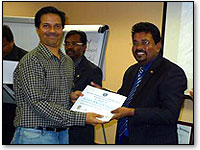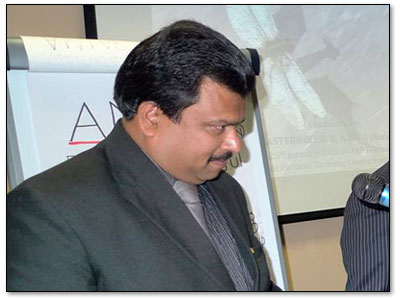
Dubai : A Speechcraft program conducted by the ACE Toastmasters Club was concluded here at the Al Futtaim Training Center, Dubai on 11th February 2010. 25 individuals from different walks of life attended the program co-ordinated by Mr. Binu Shanker.
The ACE toastmasters club was formed as part of the KERA - Kerala Engineering Alumni - the association of engineers from Kerala in the UAE. The Speechcraft programme is conducted occasionally by the club to provide a crash course in public speaking and also to introduce new members to the functioning of the club.
 Speechcraft coordinator Mr. Binu Shanker
Speechcraft coordinator Mr. Binu ShankerThe Speechcraft program allows experienced Toastmasters to present the fundamentals of public speaking to non-members in an atmosphere of a Toastmasters club meeting says Binu who is on his way up the leadership ladder of the Toastmasters club. It’s a great way to promote membership in your community or company club, as Speechcraft brings prospective new members to a meeting to see, first-hand, what Toastmasters is all about.
Speechcraft has several benefits. Participants become a part of your club meetings. They come to know and enjoy the club's fellowship while gaining confidence and training in their communication skills. Many Toastmasters members indicate they joined their club because they participated in a Speechcraft program. Clubs that conduct a Speechcraft program at least once each year have few membership problems.
Speechcraft also benefits the members of an existing club. The program gives club members new opportunities to exercise their communication and leadership abilities. It also increases interest and attendance among all members.
Speechcraft provides participants with a sample of the Toastmasters club experience, making it easier for participants to become members at the conclusion of the program.
Usually, Speechcraft participants are prospective new members for a club. They will join the club if they are impressed by the activities and members and can see the benefits they will gain from their experience.
Clubs usually charge a reasonable fee for conducting any Success/Communication and Success/Leadership program for nonmembers. The fee covers the program expenses (materials, refreshments, room rental). Any remaining money is placed in the club’s treasury. No individuals, educational institutions or other organizations are allowed to derive financial gain either directly or indirectly from the presentation of these programs.
Toastmasters International is a non - profit educational organization that teaches public speaking and leadership skills through a worldwide network of meeting locations.
Headquartered in Rancho Santa Margarita, California, the organization has more than 250,000 members in more than 12,500 clubs in 106 countries. Since 1924, Toastmasters International has helped people of all backgrounds become more confident in front of an audience.
Toastmasters International is the leading movement devoted to making effective oral communication a worldwide reality.
It is basic to this mission that Toastmasters International continually expand its worldwide network of member clubs, thereby offering ever-greater numbers of people the opportunity to benefit from its programs.
Toastmasters International empowers people to achieve their full potential and realize their dreams. Through our member clubs, people throughout the world can improve their communication and leadership skills, and find the courage to change.
Toastmasters International’s core values are integrity, dedication to excellence, service to the member, and respect for the individual. These are values worthy of a great organization, and we believe we should incorporate them as anchor points in every decision we make. Our core values provide us with a means of not only guiding but also evaluating our operations, our planning, and our vision for the future.
The origin When people hear the word “basement” they’re more likely to picture mold and spiders than the birth place of a global communication and leadership training organization. But a basement in a YMCA in Santa Ana, California, is exactly where, in 1924, Ralph C. Smedley held the first meeting of what would eventually become Toastmasters International.
Smedley began working as director of education for a Young Men’s Christian Association (YMCA) after he graduated from college. He observed that many of the young patrons needed “training in the art of public speaking and in presiding over meetings” and Smedley wanted to help them. He decided the training format would be similar to a social club. During the early 1900s the word “toastmaster” referred to a person who proposed the toasts and introduced the speakers at a banquet. Smedley named his group “The Toastmasters Club” because he thought it suggested a pleasant, social atmosphere appealing to young men.
When Smedley started the Toastmasters group at the YMCA in Santa Ana, California, members practiced speaking skills in a supportive, informal atmosphere. The seedling club blossomed. Word spread about Smedley’s YMCA experiment and soon people in other communities and even other states began asking for permission and help to start their own Toastmasters meetings. By 1930 the burgeoning clubs had established a federation to help coordinate activities and provide a standard program. Toastmasters became Toastmasters International after a speaking club in New Westminster, British Columbia, Canada, expressed interest in joining the organization.
A series of rented office spaces in Southern California served as Toastmasters International’s “home office” until 1962. That year the staff moved into its first World Headquarters building in Santa Ana, not far from the YMCA where the first Toastmasters club met.
Over the next three decades the number of Toastmasters grew, and so did the need for a larger staff to service them. World Headquarters relocated in 1990 to its new building in Rancho Santa Margarita, California, about 20 miles south of Santa Ana. See our timeline for a detailed account of Toastmasters' history.
The evolution of its educational programs and resources are a big part of Toastmasters International’s success and growth. Training has expanded from the 15-project manual Basic Training for Toastmasters, developed by Smedley, to include other materials to help members develop skills in listening, giving feedback, decision-making, delegating and mentoring.
 Click to enlarge
Click to enlargeWith more than 12,500 clubs and more than 250,000 members in 106 countries, Ralph Smedley’s “basement brainstorm” continues to thrive in the 21st century. And through the Speechcraft programmes conducted occasionally, it attracts more and more aspiring speakers to the organization and help them learn the arts of speaking, listening, and thinking, vital skills that promote self-actualization, enhance leadership potential, foster human understanding, and contribute to the betterment of mankind.


0 Comments:
Post a Comment
Links to this post:
Create a Link
« first page